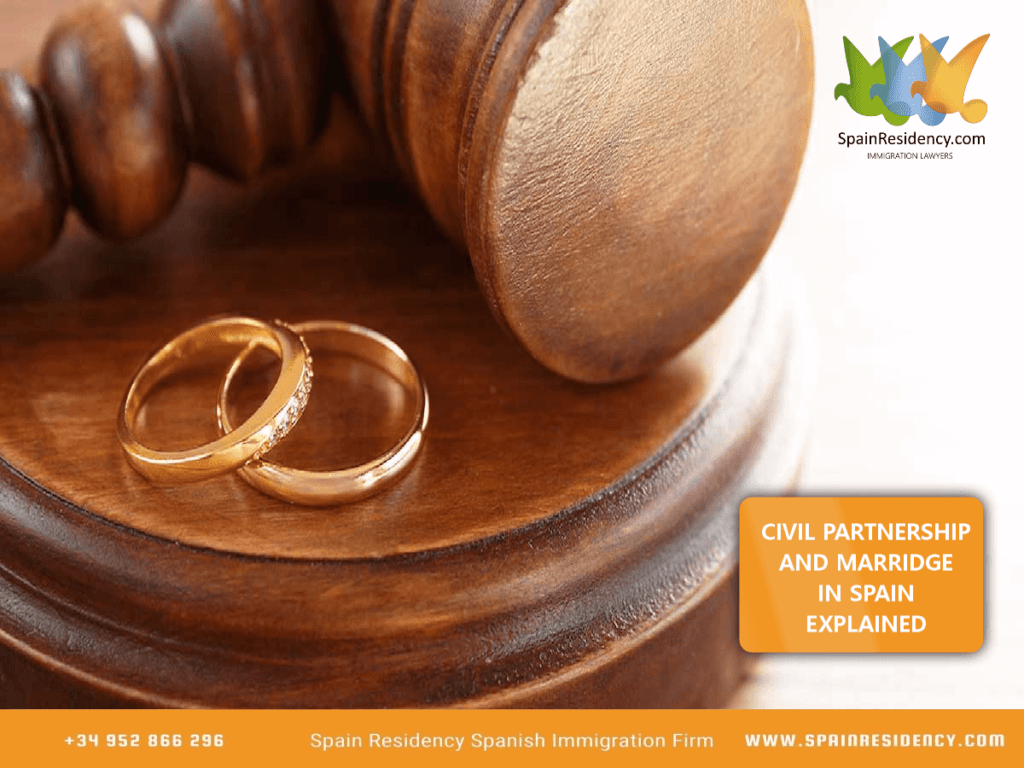To obtain residency, which is more recommendable, civil partnership or matrimony in Spain, and what are the differences and similarities between these?
If you intend to undertake immigration procedures, you can rely on our adept team with 20 years’ experience in this field.
Menu:
In this post we cover the following: (click any section to see its content)
Which is more recommendable, marriage or a civil partnership?
- CIVIL PARTNERSHIP OR MARRIAGE SIMILARITIES AND DIFFERENCES »
- PROCEDURES FOR GETTING MARRIED OR REGISTERING AS CIVIL PARTNERSHIP »
- RIGHTS OF THE SPOUSE OR REGISTERED PARTNER »
- SPANISH EU RESIDENCY CARD »
- SPANISH CITIZENSHIP »
- IS MARRIAGE OR A CIVIL PARTNERSHIP MORE RECOMMENDABLE? »
- ALL TYPES OF RESIDENCY AVAILABLE IN SPAIN »
- SCHEDULE AN APPOINTMENT WITH A SOLICITOR »
CIVIL PARTNERSHIP OR MARRIAGE SIMILARITIES AND DIFFERENCES:
Marriage or registration of civil partnership with an EU citizen are common routes to establish a family connection allowing a non-EU citizens to apply for an EU community residence card.
While both avenues grant access to a residence and work permit in Spain, distinctions exist not only in immigration aspects but also in other facets examined below.
PROCEDURES FOR GETTING MARRIED OR REGISTERING AS CIVIL PARTNERSHIP:
From the procedural standpoint of partnership registration or marriage celebration, notable disparities emerge.
Marriage in Spain adheres to a state-level law, ensuring uniformity in requirements, procedures, and effects throughout the national territory.
Mixed marriages (Spanish-foreign) entail a mandatory prior filing, processed in the civil registry of the judicial district of residence or before a notary. This step determines the capacity to marry and scrutinizes the marital consent.
On the flip side, registering as a couple varies significantly across Autonomous Communities, each with its distinct regulations. Naming conventions differ, as do the derived rights and obligations, with unique registration prerequisites.
For instance:
- Madrid mandates cohabitation and registration.
- Aragon necessitates two years and a public deed.
- Valencia and the Balearic Islands require a record with the head of the Register of Registered Unions.
- Asturias accepts various possibilities, including shared children, cohabitation, public declarations, or registration in the Register of Registered Unions.
- The Basque Country and Andalusia only register couples in the Register of Couples.
- In regions without specific laws (La Rioja, Castilla y León, Castilla-La Mancha, and the Murcia region), registration can occur in the Register of Couples or City Council, maintaining an administrative nature.
RIGHTS OF THE SPOUSE OR REGISTERED PARTNER:
Considering the rights emanating from both unions, distinct scenarios emerge:
- Labour Rights: Registered couples enjoy the same rights as married couples, encompassing labor leave for partner-related events, paternity or maternity leave, aligning with civil servants’ benefits.
- Children: Regardless of the union type or living arrangements, shared children incur no distinction in rights and obligations.
- Taxation: Only married couples, not registered partners, can file joint declarations.
- Widower’s Pension: Unlike spouses, registered partners lack a direct entitlement to a widower’s pension.
In matters of donations and exemptions, spouses enjoy privileges not extended to registered couples. However, both unions share access to aid, grants, public housing, scholarships, etc.
The complexities in choosing between marriage and partnership necessitate a nuanced understanding of these distinctions, ensuring informed decisions aligning with individual circumstances.
SPANISH EU RESIDENCY CARD:
From the point of view of Immigration, both marriage and registration as a registered couple, between a non-EU citizen and a EU citizen, allows the non-EU citizen partner/spouse to obtain a Spanish EU Residency Card, since the mere existence of a bond, accredited through a marriage certificate or registered couple certificate, would entitle them to reside and work in Spain under the same conditions as their partner who holds Spanish EU Residency.
In other words, a Non-EU citizen who is married to an EU citizen or registered as a civil partner with a EU citizen would be able to apply for a community card. This card would allow them to reside and work in Spain for a period of five years, and it could be renewed for additional periods of five years.
The community card is a very important document for non-EU citizens who are married to or registered as civil partner with an EU citizen. It allows them to live and work in Spain legally and on the same terms as Spanish citizens.
SPANISH CITIZENSHIP:
In this area we find an important distinction.
As we know, to apply for Spanish nationality by residence, the applicant must meet certain periods of legal, continuous and immediately prior to the submission of the application, which, in principle, will depend on the applicant’s country of origin (10, 5 or 2 years depending on the case). However, our Civil Code, in its Article 22, contemplates certain cases in which the required residence time could be significantly reduced (to only one year) if the applicant is in any of the cases mentioned, one of them being, “having been married to a Spaniard for one year”.
In other words, someone who has been married to a Spaniard for one year could apply for nationality with just one year of legal residence in Spain.
However, the same does not happen in the case of being a registered partner with a Spaniard. In other words, our legislation will only benefit the foreigner with the reduction of the legal period required for the purposes of nationality in the case of being married to a Spanish National. While if they are a registered partner, the required periods will depend on the nationality of the applicant.
In summary, the main differences between marriage and registered partnership in Spain are as follows:
- Procedure: Marriage is regulated by a state law, while registered partnership is regulated by different laws in each autonomous community.
- Rights: Married couples have the same rights as registered couples in most areas, but there are some differences, such as the right to a widow’s pension.
- Nationality: Married couples can apply for Spanish nationality after one year of legal residence, while registered couples must meet the standard residency requirements for their country of origin.
WHICH IS MORE RECOMMENDED; MARRIAGE OR A PARTNERSHIP:
The answer to this question depends on individual circumstances. If you are interested in having the same rights as a married couple in all areas, then marriage is the best option. However, if you are interested in obtaining Spanish nationality after one year of legal residence and you are marrying a Spanish national, then marriage is the only option.
ALL TYPES OF RESIDENCY AVAILABLE IN SPAIN:
- Golden-Visa Spain (Spain citizenship by investment)
- Non-Lucrative visa Spain (Spain visa non lucrative)
- Self-Employed visa Spain (self employed expats in Spain)
- Digital-Nomad visa Spain (remote worker in Spain)
Please see-here our video-blog with options and legal-advice to obtain residency in Spain.
ARE YOU CONSIDERING CIVIL PARTNERSHIP OR MATRIMONY IN SPAIN?
Do you need legal assistance in Spain?
We are a Spanish Solicitor and assist our clients with all types of residency applications.
Permanent residency is obtained after 5 years of Spanish Residency through Self-Employed Residency, Digital-Nomad, Non-Lucrative Residency or Golden-Visa. This followed by 5 years as a permanent resident in Spain and means you can then obtain Spanish Citizenship with a Spanish Passport.




